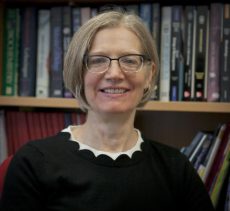
Professor Maggie Smith, a leading molecular microbiologist at the University of York, addressed a room full of humanists and science enthusiasts in Leeds on Wednesday night for the first ever Darwin Day Lecture organised by the British Humanist Association (BHA) in the city of Leeds. As with past Darwin Day Lectures, Smith’s took evolution as its theme, and explored the latest findings of research into antibiotic resistance, which former Prime Minister David Cameron once ominously warned threatened to send humanity ‘back to the Dark Ages.’
Arguing that there were ‘few better examples of evolution than antimicrobial resistance,’ Smith showed research which predicted that deaths from antimicrobial-resistant bugs could number 10 million by 2050, making it as significant a killer as cancer is now. Unlike cancer, however, this new wave of illness could interrupt many of the medical advances that make modern life possible, as Smith listed procedures that were reliant on antibiotics: the delivery of premature babies, simple hip replacements, cancer treatments, and much more. A world without antibiotics would be a terrifying place, making the former Prime Minister’s description of a 21st century Dark Age a real possibility. ‘It is antibiotics that allowed modern medicine,’ said Smith, without which ‘we can’t treat disease or prevent infection.’
Again drawing inspiration from Darwin, the lecture turned towards adaptation: how can this fate be avoided? Smith quoted Darwin’s line that ‘It is not the strongest of species, nor the most intelligent that survives. It is the one that is most adaptable to change.’ In identifying a strategy for adaptation and survival, Smith pinpointed our chronic overuse of antibiotics today, explaining that in some areas, waste water contained more antibiotic than the blood of patients receiving antibiotic treatment. Such casual misuse is killing our species: ‘Without proper antibiotic stewardship,’ said Smith, ‘resistance develops fast.’ New antibiotics, faster diagnoses and better models of prescribing antibiotics, as well as greater antibiotic surveillance and globally enforced regulation of their use, would be essential. Governments could also look to remove perverse incentives for drugs companies to see their antibiotics more readily prescribed.
On a note of hope, she touched on the possibility that future advances in science could help humanity avoid another Dark Age: synthetic biology may present the key to the continuation of our way of life. Through ‘genome mining’ humanity might yet uncover new antibiotics for which existing bugs have no resistance. A greater understanding of enzymes will also open up the possibility that we can create designer antibiotics in a lab. Smith warned that neither of these possibilities were assured and that a new emphasis on stewardship of antimicrobials was essential. The need for greater investment is urgent, she argued, as humanity will need to develop a very large arsenal of antibiotics and a framework for ensuring vigilance in their use.
Professor Smith’s lecture is part of a short season of events celebrating Darwin Day, a commemorative event held on 12 February each year to mark the life and work of Charles Darwin. It will be followed on 10 and 11 February by two Darwin Day Lectures from theoretical physicist Professor Lawrence Krauss, who will lecture on ‘Cosmic natural selection,’ chaired by BHA patron Professor Richard Dawkins. And on 12 February, in Belfast, new BHA patron cosmologist Professor Stephen Smartt will host a Belfast Darwin Day Quiz. The BHA’s section Young Humanists will also be using Darwin Day to launch its first ever ‘Young Humanists debate’ on Twitter, on 15 February, which asks: ‘What are the limits to freedom of speech?’
Notes
The British Humanist Association (BHA) is the national charity working on behalf of non-religious people who seek to live ethical and fulfilling lives on the basis of reason and humanity.
Professor Maggie Smith is Chair of Microbiology at the University of York, and Chair of TARGeTed Antimicrobial Resistance (AMR) Project, developing new interdisciplinary collaborations and innovative approaches to tackle AMR challenges. Maggie did her first degree in Microbiology and Biochemistry. in Leeds. She studied in Bristol for her PhD, looking at the processes by which antibiotics are taken into bacterial cells. She then embraced gene cloning technologies during her post-doc years in Leeds and Glasgow, working on how genes are regulated. Her first post as a lecturer was at Stirling University, where she started working with the antibiotic-producing bacteria, Streptomyces. She then moved to Aberdeen and her research focused on how certain viruses take advantage of bacterial DNA to replicate, and how DNA is naturally moved around and rearranged within chromosomes. Now as Chair of Microbiology at the University of York, Maggie has a portfolio of research projects that range from antibiotic biosynthesis to antibiotic resistance.
Previous Darwin Day lecturers include Professor Jerry Coyne, Dr Eugenie Scott, Professor Alice Roberts, Professor Sir David King, Dr Adam Rutherford, and Dr Susan Blackmore.
